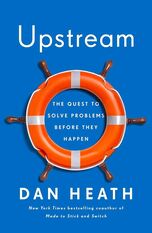Author: Dan Heath
ISBN: 9781787632745
APA Style Citation
Health, D. (2020). Upstream: The quest to solve problems before they happen. Avid Readers Press, New York, N.Y.
Buy This Book
https://www.amazon.com/Upstream-Quest-Problems-Before-Happen/dp/1982134720
| activity_upstream_3.pdf |
Chip and Dan Heath have made a name for themselves in the field of decision-making with books like Switch, Made to Stick, and The Power of Movement. In Upstream, Dan Heath goes it alone (but dedicates the book to his brother) to address how to identify and defuse problems before they grow and become unmanageable. Health incorporates many of the topics from their other books to help identify problems. The book is broken into three main sections: the factors that force people into downstream thinking, the questions upstream leaders must ask, and ways in which to identify new problems and push even further upstream.
Health opens with a story about the travel site Expedia. In 2012, the company received 20 million calls regarding travel itineraries. This cost the company $100 million, and they needed to find a way to get customers what they needed while also decreasing call volume and these costs. They used a three-pronged approach: an automated telephone option to resend a travel itinerary, change how emails were sent to avoid spam filters and make the website more user-friendly so customers could solve the problem on their own.
Expedia decreased the percentage of callers from 58% to 15%. Health explains this as an upstream solution to a problem, rather than continuing to wait for the calls. Expedia found a way to reduce call volume, thereby saving the company millions of dollars each year. Similarly, police and medical personnel spend most of their time engaged in reactive behaviors when time could be spent “upstream” to prevent criminal activity or health conditions before they occur or before they become dangerous.
Health calls out the field of psychology for only intervening after individuals are experiencing a mental health episode, using drugs, or experiencing trouble in a relationship. He proposes that we should identify those who might be at risk early and then create interventions so that the problems never arise. The average expense related to health care in most countries is $1 spent upstream to $2-3 spent downstream. In the United States, the ratio is 1 to 1, making our system far more reactive (downstream) and thus far more expensive because medical conditions are not treated until they become full-blown problems. In Norway, for example, a family will pay nothing for the prenatal visits or the birth of a child, making visits more accessible and resulting in less high cost and dangerous complications at birth.
When problems are identified early proactive interventions can help improve peoples. So much time is spent trying to repair what is broken, but Heath recommends looking to the source, and fixing that to make and even larger impact.
Other Related Resources
Author’s website
https://heathbrothers.com/books/upstream/
Video: Dan Health Upstream Heros
https://www.youtube.com/watch?v=Edoj7cF5QKs
Podcast: Upstream thinking and moment making
https://www.goodlifeproject.com/podcast/dan-heath/
Psychological Figures and Concepts
Availability heuristic
Functional fixedness
Inattentional blindness
Habituation
Mental set
Selective attention

 RSS Feed
RSS Feed